Internship: Your Career Launchpad Starts Here
An internship is more than just a resume builder; it’s your golden ticket to transforming ambition into achievement. Whether you’re a student eager to break into your dream industry or a mid-career professional seeking a new direction, the right internship can open doors, spark insights, and fast-track your career in ways few experiences can.
At its core, an internship is a short-term, often structured work experience offered by employers to give individuals, usually students or recent graduates, a taste of real-world professional life. But in 2025, internships have evolved beyond photocopying documents or shadowing seniors. They’ve become strategic, skill-building opportunities that bridge the gap between academic knowledge and professional application. With many employers now viewing internship performance as a litmus test for full-time potential, it’s no wonder that candidates who intern often enjoy a competitive edge in today’s saturated job market.
But here’s the catch: not all internships are created equal. Some are stepping stones to six-figure careers. Others are time-drains with little to show for the effort. The difference? Strategy. Preparation. And the ability to showcase every task, responsibility, and skill as a measurable outcome on your CV or LinkedIn profile.
In this comprehensive guide, we’ll explore everything you need to know about internships in 2025, from the types available and the latest hiring trends to insider tips on how to shine during your placement and leverage that experience into job offers. We’ll also share real case studies, expert advice from Brendan Hope’s CV writing and career coaching team, and practical tools to make your internship a launchpad, not just a learning curve.
So, if you’re wondering whether an internship is worth it, how to get one, or how to turn it into something greater, keep reading. Your future self will thank you.
Just left university? See our guide on taking your first steps after university.
Why Internships Matter More Than Ever in 2025
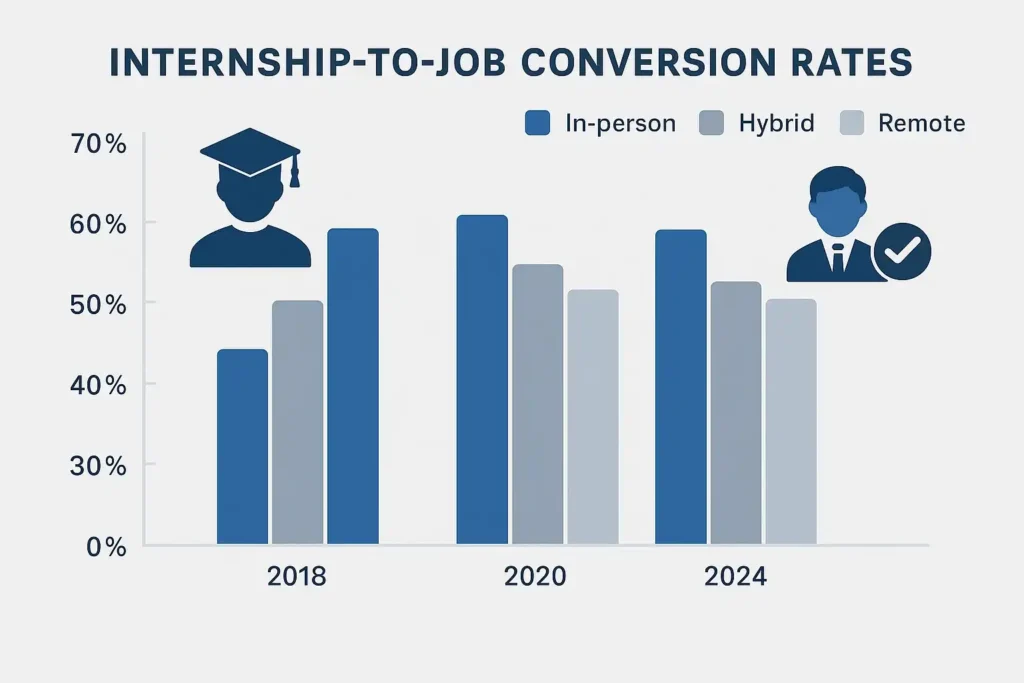
In the ever-evolving landscape of employment, internships have shifted from being a “nice-to-have” to a “must-have.” Gone are the days when an internship was considered optional or merely supplementary. In 2025, it’s a strategic career necessity.
The statistics speak volumes. According to the National Association of Colleges and Employers (NACE), nearly 66% of interns received job offers from the companies they interned with, and approximately 53% accepted those offers. Internships have become more than a foot in the door; they’re a primary pipeline for full-time hiring. Even more telling, over 85% of employers surveyed by NACE believe that internships are “extremely valuable” in preparing candidates for long-term success.
But the value of internships goes beyond just employment. For students and graduates navigating a volatile job market, internships provide clarity, confidence, and critical workplace exposure. They allow individuals to test-drive career paths, build essential skills, and grow professional networks, before committing to a specific industry or role. With hybrid work models now common, internships are also adapting, offering more flexibility and broader access than ever before.
Moreover, 2025 has seen a surge in remote internships, which account for a growing percentage of all placements. This shift has made internships more inclusive, especially for students from underserved communities or those unable to relocate. Yet, it also means interns must be even more proactive and tech-savvy to stand out in virtual environments.
Employers aren’t just looking for degrees anymore; they want proof of adaptability, initiative, and soft skills. Internships are the perfect way to demonstrate these attributes in action. In fact, many recruiters now use internship performance as a benchmark for employability, weighing it more heavily than GPA or academic credentials.
For graduates seeking a competitive edge or professionals looking to pivot into new industries, internships in 2025 are indispensable. They offer a chance to gain targeted experience, build a portfolio, and even transition into full-time employment with minimal friction. Simply put, if you’re serious about career growth, investing in the right internship is no longer optional; it’s essential.
Who Should Consider an Internship Today?
The modern internship is no longer reserved for undergraduates scrambling to gain experience before graduation. In 2025, internships have expanded to embrace a broader, more diverse audience. Whether you’re fresh out of university, switching industries, or even reentering the workforce after a break, an internship could be exactly what you need to gain traction.
Graduates, for instance, often find themselves in the paradox of needing experience to get a job, yet needing a job to gain experience. An internship bridges that gap. It offers them a structured environment to apply theoretical knowledge, learn professional etiquette, and make meaningful connections that can kickstart their careers.
Career changers, those transitioning from one industry to another, also benefit immensely from internships. When you lack direct experience in a new field, a short-term role lets you showcase transferable skills, build domain-specific knowledge, and demonstrate commitment to potential employers.
Even executives and professionals returning after a career break, perhaps due to parental leave or relocation, can leverage internships. Reentry internships or “returnships” are now commonly offered by forward-thinking companies eager to tap into experienced talent. These roles provide a smooth, low-pressure pathway back into full-time employment.
Ultimately, anyone looking to gain industry insight, build a credible CV, and test new waters professionally should consider an internship. It’s a strategic move that offers low risk, high learning, and often, career-defining rewards.
Exploring Types of Internships: Paid, Remote, Virtual & More
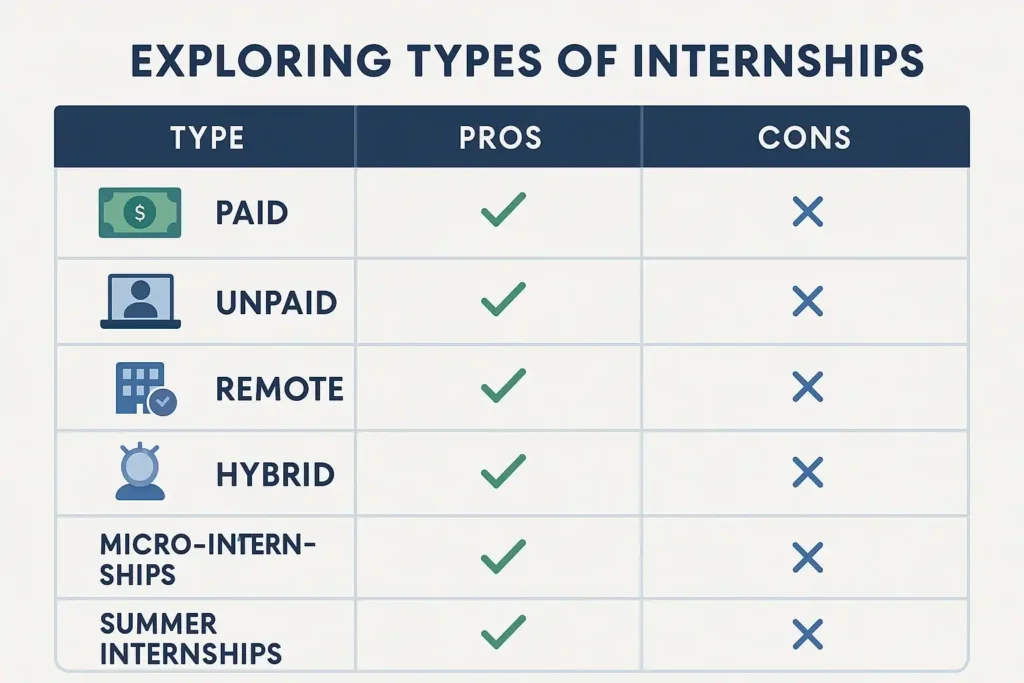
Internships come in all shapes and sizes, and choosing the right type can significantly influence the skills you develop and the opportunities that follow. While they all aim to provide hands-on experience, each format offers a unique advantage and potential drawbacks. Understanding these distinctions is crucial if you want to make an informed choice that aligns with your goals.
Paid Internships
Often the most sought-after, paid internships offer not just professional development but financial compensation as well. These roles tend to be more structured, competitive, and aligned with future employment pipelines. They’re common in industries like finance, engineering, consulting, and tech. The pros are clear: income, motivation, and often better-defined learning outcomes. On the flip side, their competitive nature can make entry difficult, especially for those with limited experience.
Unpaid Internships
Still prevalent in creative fields like media, fashion, non-profits, and the arts, unpaid internships can be valuable learning experiences, provided the work is substantive. They allow students to build a portfolio, test drive industries, and establish contacts. However, they do come with ethical concerns, especially when organisations use interns for menial tasks without offering clear educational benefits. If considering an unpaid role, ensure it offers mentorship, skill-building, or a strong reference in return.
Remote Internships
In a post-pandemic world, remote internships have gained widespread popularity. They’re ideal for students in rural areas, those with limited transportation, or individuals juggling multiple responsibilities. Remote roles emphasise communication, self-discipline, and digital fluency. The drawback? Less face-to-face networking and fewer organic mentoring moments. Still, when structured well, they can be just as impactful as traditional formats.
Hybrid Internships
These combine in-person and remote work, offering a middle ground. Interns get the chance to build relationships during office days while enjoying the flexibility of remote work. This format is especially effective for developing both soft and hard skills, adaptability, time management, and professionalism.
Summer Internships
Typically lasting 8–12 weeks, summer internships are intensive, project-driven placements. They’re popular among undergraduates and often serve as a pipeline to graduate schemes. The condensed timeline means a steep learning curve, but also immediate, tangible outcomes.
Micro-Internships
Shorter, project-based experiences that last a few weeks or even days. Ideal for those testing a new field or balancing multiple responsibilities, they offer focused exposure. However, their brevity can limit networking and depth of learning.
Industry-Specific Internships
Certain sectors offer unique formats. For instance, tech internships often involve hackathons or product builds, while legal internships may center around case research or court observations. Tailoring your search based on industry norms can yield better alignment with long-term goals.
Each internship type has a role to play in career development. The key is to assess what you need most, experience, income, exposure, or flexibility, and choose the format that delivers on that front.
How to Prepare for an Internship Like a Pro
Before the first day on the job, preparation can make all the difference between simply showing up and truly standing out. While internships are designed to be learning experiences, walking in with a clear strategy and a proactive mindset sets you apart from the pack, sometimes before you even land the role.
Start with Research
Begin by researching the company thoroughly. Go beyond their website, review their social media, recent press releases, Glassdoor reviews, and any LinkedIn insights from current or former employees. Understand their values, mission, key projects, and workplace culture. This knowledge not only impresses during interviews but also helps you adapt faster when you start.
Clarify Your Goals
Ask yourself: What do I want to gain from this internship? It might be mastering a technical skill, improving client communication, or simply getting clarity on a career path. Write down two to three measurable goals before you begin. Interns who start with intention often walk away with stronger results and more relevant CV entries.
Polish Your CV and LinkedIn Profile
Make sure your resume is tailored to the role you’re applying for, highlighting academic achievements, volunteer work, and any transferable skills. If you’re working with a professional CV writer like Brendan Hope, this is the perfect time to refine your narrative. Likewise, ensure your LinkedIn profile is professional and keyword-optimised; many recruiters check profiles during and after the application stage.
Practice Interviewing
If you’re applying to competitive programs, mock interviews can give you an edge. Familiarise yourself with common internship interview questions, and rehearse using the STAR (Situation, Task, Action, Result) method. Brendan Hope’s interview preparation sessions can help polish your responses and boost your confidence.
Build Your Network Early
It’s never too soon to start connecting. Follow the company on LinkedIn, engage with relevant posts, and reach out to current or former interns to ask about their experiences. Not only can this give you insider tips, but it might also help you get noticed during the application process.
Gather Your Tools
Before starting, prepare a simple work journal or digital log. This will help you track tasks, skills learned, and accomplishments in real-time, making it much easier to convert your experience into bullet points for your CV or future job interviews.
The secret to a successful internship lies in the groundwork. A few thoughtful steps now can help you hit the ground running, and ultimately, stand out when it counts the most.
Success Habits During Your Internship
Internships are more than just a time to observe, they’re your audition for the professional world. And while technical skills are important, it’s often the soft skills and daily habits that distinguish a forgettable intern from an unforgettable one. In fact, according to numerous employer surveys, traits like initiative, communication, and adaptability often outweigh academic performance when assessing intern success.
Be Proactive, Not Passive
Don’t wait to be told what to do. Successful interns anticipate needs, volunteer for tasks, and actively seek out ways to contribute. Something as simple as asking, “Is there anything else I can help with?” goes a long way. This level of engagement shows you’re invested, not just present.
Master the Art of Communication
Effective communication is your greatest asset. Keep your manager updated on your progress, clarify instructions when needed, and ask thoughtful questions. Whether you’re writing emails or joining meetings, being articulate, concise, and professional builds credibility fast. In remote or hybrid setups, over-communication is better than under-communication.
Seek Feedback Early and Often
Don’t wait until the final review to ask how you’re doing. Approach your supervisor early in the internship with a simple request: “I’d love your feedback so I can improve.” This openness demonstrates maturity and helps you course-correct while there’s still time to impress.
Stay Curious and Coachable
The most admired interns are lifelong learners. They read company materials, ask intelligent questions, and welcome correction with gratitude rather than defensiveness. Show you’re there to grow, not just to complete a checklist.
Be Punctual and Reliable
Whether you’re logging into Zoom or arriving at an office, punctuality is non-negotiable. Meet deadlines, follow through on commitments, and manage your time responsibly. This simple habit earns trust and can distinguish you in a sea of equally qualified peers.
Document as You Go
Keep a running log of your daily responsibilities, challenges, and wins. This habit not only prepares you for future interviews but also helps when updating your CV or LinkedIn profile. Brendan Hope’s clients often remark how invaluable this record-keeping becomes when we’re crafting powerful, outcome-based job descriptions.
The habits you build during an internship often set the tone for the rest of your career. Focus less on perfection and more on consistency, curiosity, and communication, and you’ll leave an impression that lasts well beyond your final day.
Top Mistakes Interns Make, and How to Dodge Them
Every internship is a learning experience, but some lessons are best learned the easy way, by avoiding the common missteps that derail even the most talented candidates. Interns often start with enthusiasm, only to lose steam or focus because of preventable pitfalls. If you want to rise above the rest, sidestepping these errors is crucial.
Mistake 1: Waiting for Instructions
One of the biggest red flags for employers is an intern who sits idle. As one Reddit user candidly put it, “You’re not there to be babysat. If you’re not busy, find a way to help.” Internships aren’t always perfectly structured, and taking initiative, even if it’s just organising files or proposing a new idea, can turn a dull experience into a dynamic one.
Mistake 2: Treating It Like a Class Assignment
Internships aren’t graded, but they are evaluated. A Glamour article captured this perfectly with a former intern saying, “I became a ‘yes’ woman, always saying yes to any assignment.” That mindset helped her earn the respect of her supervisors and a job offer. Unlike school, your value isn’t in just completing tasks, but in how you approach them.
Mistake 3: Not Asking Questions
Many interns fear sounding inexperienced, so they avoid asking questions. Ironically, this often leads to confusion or poor-quality work. Smart interns ask clarifying questions early, which saves time and demonstrates accountability. Remember, curiosity shows you’re engaged, not clueless.
Mistake 4: Overlooking Professionalism
It’s easy to forget that even as a student, you’re in a professional environment. Arriving late, using slang in emails, or over-sharing in meetings are quick ways to erode trust. Treat every day like a job interview; you’re building a brand with every interaction.
Mistake 5: Failing to Build Relationships
Internships aren’t just about tasks, they’re about people. Interns who avoid social events, skip team check-ins, or fail to stay in touch after the placement lose out on long-term benefits. Building connections now can open doors later.
In the end, mistakes are part of the learning process. But with a bit of awareness and humility, you can avoid the most common ones, and make your internship not just a stepping stone, but a standout chapter in your career story.
Making the Most of a Virtual Internship
Remote internships have opened the door to opportunities that were once out of reach for many, especially those unable to relocate or commute. Yet, with this flexibility comes a unique set of challenges. Without the buzz of an office, spontaneous hallway chats, or direct oversight, interns must work harder to stay visible and build relationships. But the good news? With the right tactics, you can turn a virtual internship into a powerful launchpad.
Set Clear Expectations Early
Before your first task, ensure you’re aligned with your supervisor on expectations. Clarify working hours, communication preferences, reporting structure, and key deliverables. This not only prevents misunderstandings but also demonstrates your professional foresight.
Communicate Frequently, and Thoughtfully
In a virtual environment, silence can be misinterpreted. Make a habit of sending regular progress updates and be proactive in asking for feedback. A quick end-of-week summary email outlining your accomplishments, questions, and upcoming goals can make a huge difference. As one Reddit intern advised, “When you’re remote, over-communicate. Let them know you exist.”
Create a Professional Workspace
Whether you’re working from a dorm room or your kitchen table, create a space that supports focus and minimises distractions. Good lighting, a decent chair, and a clean background on video calls all contribute to your professional presence, even virtually.
Join Every Meeting You Can
In a physical office, learning often happens by osmosis. In remote settings, you must be intentional about exposure. Ask to sit in on meetings, even ones not directly tied to your role. The more you’re seen and heard, the more likely you’ll be remembered when opportunities arise.
Keep Track of Your Impact
Document your contributions as you go: projects completed, problems solved, ideas implemented. These will not only boost your confidence but also serve as material for future CV updates or LinkedIn entries. Brendan Hope often helps interns turn these reflections into powerful resume bullet points.
Stay Social, Even Online
Don’t skip optional Zoom socials or ignore the Slack watercooler channel. Relationship-building is still essential, and being personable, even through a screen, can lead to unexpected mentorship or references later on.
Ultimately, success in a remote internship requires intention, initiative, and a strong virtual presence. It’s not just about doing the work, it’s about making sure your work gets noticed.
Track, Log, and Showcase Internship Achievements
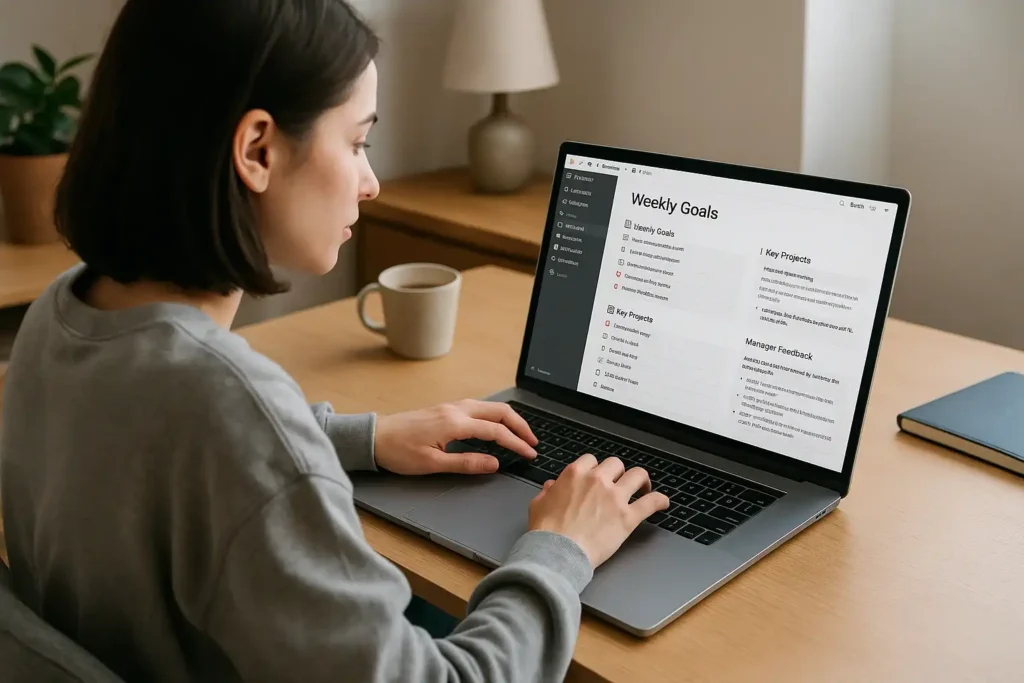
One of the most overlooked yet impactful habits you can develop during your internship is documentation. Whether you’re working in a bustling office or remotely from your bedroom, keeping a detailed log of your contributions ensures your experience doesn’t fade into vague memory. Instead, it becomes a portfolio of proof, something that employers love and CV writers like Brendan Hope can turn into gold.
Start a Daily or Weekly Log
At the end of each day (or week), jot down the projects you worked on, the tasks you completed, and any challenges or insights that stood out. Include dates, names of collaborators, tools or platforms used, and quantifiable results wherever possible. Did you help reduce email response time by 20%? Capture that. Assisted with a market analysis that shaped a campaign? Note it down.
Use Digital Tools
Apps like Notion, Evernote, Trello, or even a simple Google Doc can help you organise your entries. Some interns create a dedicated “Internship Tracker” with sections for goals, achievements, lessons learned, and feedback received. Others go a step further and develop visual portfolios, especially useful in design, marketing, or content creation roles.
Collect Feedback and Emails
Save emails with positive feedback, screenshots of results, or performance reviews. These artifacts add credibility and can be powerful when compiling future job applications or prepping for interviews. A compliment today could become a reference tomorrow.
Convert Logs into Career Assets
When your internship wraps up, those logs become the foundation for updating your CV, LinkedIn profile, and even interview responses. Brendan Hope’s clients often find that this proactive tracking allows for stronger, metrics-driven statements like, “Contributed to a project that improved internal reporting efficiency by 30%.”
By documenting as you go, you make your hard work tangible and give your future self the materials to present it with confidence.
How to Translate Your Internship into a Standout CV
You’ve completed the internship, learned a ton, and maybe even impressed your supervisor, but now comes the part that truly matters: articulating your experience in a way that gets noticed by hiring managers. Turning internship tasks into career-accelerating CV content is both an art and a science, and when done right, it can elevate even a brief placement into a compelling professional narrative.
Focus on Outcomes, Not Just Duties
Employers don’t want a list of what you were told to do, they want to know what you accomplished. Shift the emphasis from passive responsibilities to active contributions. Instead of writing “Assisted with marketing campaigns,” try “Collaborated on a cross-functional campaign that increased newsletter engagement by 18%.” This kind of transformation demonstrates initiative, context, and impact.
Use Powerful Action Verbs
Start each bullet point with strong verbs like developed, streamlined, spearheaded, analysed, or executed. These convey proactivity and make your CV more dynamic. Avoid vague phrases like “worked on” or “helped with,” which dilute your contributions.
Quantify Whenever Possible
Numbers are your best friend. Recruiters process hundreds of CVs, and quantifiable achievements stand out. Ask yourself: Did your work save time? Increase revenue? Improve a process? Even approximate figures lend credibility. For example, “Designed a social media calendar that boosted weekly impressions by 25%” is far more effective than “Managed social media posts.”
Tailor for Relevance
If you’re applying to a role in tech, highlight technical tools and project outcomes from your internship. For consulting, emphasise analytical skills, communication, and business exposure. Your internship can be framed to match the requirements of the job you want, just be intentional in your language.
Brendan Hope Case Example
Take the case of one of Brendan Hope’s clients, a graduate who interned at a small digital agency. At first, she described her role as “Handled social media for company accounts.” Through coaching and CV rewriting, we reframed that line into:
“Led content creation and scheduling for three brand accounts across Instagram and LinkedIn, resulting in a 40% increase in audience engagement within 8 weeks.”
The result? Her new CV landed her three interviews within a month.
Add a “Key Internship Projects” Section
If your internship involved multiple high-impact tasks, consider creating a dedicated section titled “Key Internship Projects” under your Experience heading. This lets you expand on a few standout achievements with brief narratives, keeping your CV both concise and rich in value.
Done right, your internship becomes more than just a line item, it becomes a highlight reel. With the right structure and language, you can turn every task into a testament of your potential.
Write a Compelling Internship Cover Letter
While your CV tells the story of what you’ve done, your cover letter explains why it matters and why you’re the ideal candidate for the internship opportunity. It’s your chance to inject personality, passion, and purpose into your application. A compelling internship cover letter isn’t just a polite formality; it’s often the differentiator that gets you noticed in a sea of applicants.
Start With a Strong Hook
Avoid the generic “I’m writing to apply…” Instead, open with enthusiasm and relevance. For example:
“As a marketing student who recently led a university campaign that reached 10,000+ viewers, I was immediately drawn to your internship focused on digital engagement.”
This approach shows you’ve done your homework and connects your experience directly to the company’s work.
Highlight One or Two Relevant Achievements
Don’t rehash your entire CV. Instead, pull out one or two achievements that align with the internship. Frame them in terms of value: what you contributed, what you learned, and how it makes you a stronger intern.
Show Cultural Fit and Enthusiasm
Companies want interns who align with their mission and are eager to learn. Research their values, recent projects, or culture, and weave that into your letter. Phrases like “I admire your commitment to…” or “I’m excited about the chance to contribute to…” go a long way.
Keep It Short, Specific, and Personal
A tight structure works best:
- Intro – State your enthusiasm and role you’re applying for
- Body – Highlight 1–2 achievements tied to the role
- Conclusion – Express interest, thank them, and offer to discuss further
Brendan Hope Tip
Many clients come to Brendan Hope with vague, generic cover letters. We refine them into targeted, emotionally resonant pitches that feel both professional and human. It’s about showing not just that you can do the job, but that you’ll love doing it.
A great cover letter speaks directly to the reader and makes them want to meet you. That’s the whole point, and that’s the power of getting it right.
Use Internship Experience to Nail Job Interviews
Your internship isn’t just a line on your CV, it’s a goldmine of stories that can set you apart in job interviews. Employers want proof that you can solve problems, adapt to challenges, and contribute to a team. Sharing your internship experiences with a clear narrative structure, especially using the STAR method, helps you do just that.
What is the STAR Method?
STAR stands for Situation, Task, Action, and Result. It’s a proven framework for answering behavioral interview questions. Instead of rambling, it helps you tell concise, compelling stories that highlight your strengths and outcomes.
Here’s how to apply it using a real internship example:
- Situation: “During my marketing internship, the company struggled with low engagement on social media.”
- Task: “I was tasked with developing a content strategy to boost interactions.”
- Action: “I researched trends, proposed a new posting schedule, and introduced short-form video content.”
- Result: “Within six weeks, engagement increased by 40% and followers grew by over 1,000.”
This format keeps your response focused and shows employers exactly how you think, act, and add value.
Focus on Transferable Skills
Even if your internship isn’t directly related to the role you’re interviewing for, the skills you gained, communication, project management, research, time management, are universally appreciated. Highlight how those experiences prepared you to excel in the job you’re pursuing.
Practice Storytelling with Impact
Before your next interview, brainstorm three to five STAR stories from your internship. Practice telling them out loud or work with a coach like Brendan Hope to refine your delivery. Having these stories in your back pocket can be the difference between a good impression and a job offer.
How to Add Your Internship on LinkedIn (The Right Way)
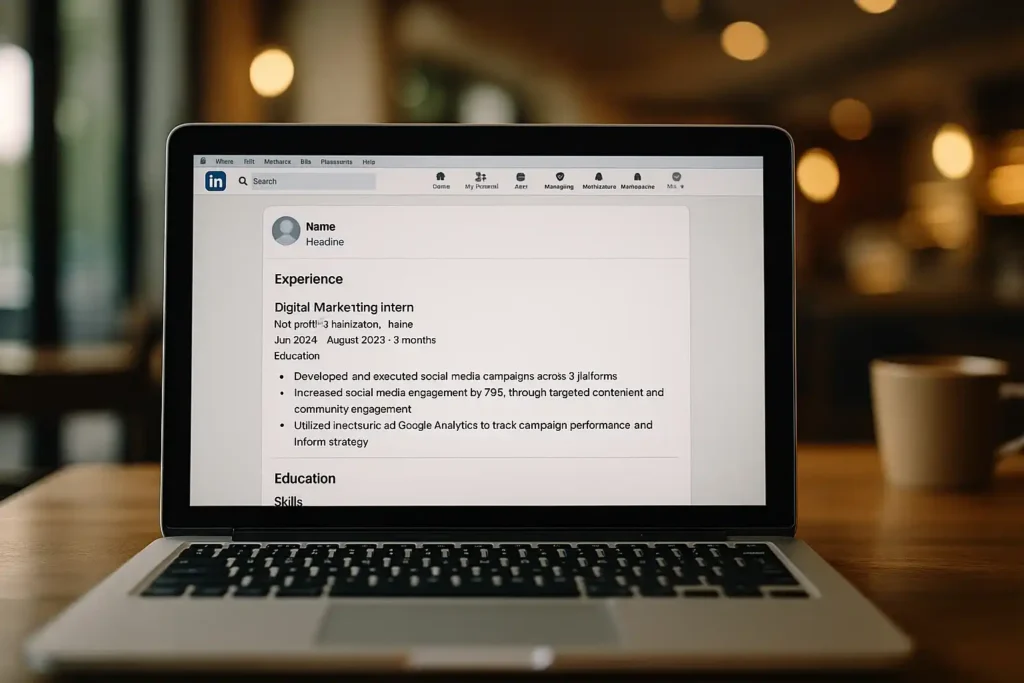
Your internship isn’t truly complete until it lives on your LinkedIn profile, strategically. While many interns simply list the job title and company, optimising your profile with the right keywords, descriptions, and endorsements can dramatically increase your visibility to recruiters and hiring managers.
Use a Clear, Professional Title
Instead of just “Intern,” include the specific role and department. For example, “Marketing Intern – Social Media & Content Strategy” instantly tells visitors what you did and helps your profile appear in keyword searches.
Craft a Value-Driven Description
Your LinkedIn description should go beyond listing tasks. Highlight your responsibilities, key projects, and measurable outcomes. Use bullet points and strong action verbs. For example:
- Created a 10-week content calendar for Instagram and LinkedIn
- Boosted engagement by 35% using targeted storytelling campaigns
- Collaborated with the sales team to align messaging
These statements show impact, not just involvement.
Incorporate Keywords Naturally
Think like a recruiter. If they’re searching for “digital marketing,” “content creation,” or “data analysis,” you want those terms in your description, without sounding forced. Align your wording with the language used in job postings for your target roles.
Ask for Endorsements and Recommendations
Reach out to your internship supervisor or colleagues and request a short recommendation. A few lines about your initiative, work ethic, or impact can add serious credibility. Even a couple of skill endorsements reinforce your strengths and increase trust.
Showcase Media or Links
If applicable, add media to your internship listing, such as a blog post you wrote, a campaign graphic you designed, or a presentation you led. This makes your profile interactive and memorable.
Optimising your LinkedIn profile is like putting your best foot forward, digitally. And with recruiters using LinkedIn more than ever to source candidates, doing this well can turn your internship from a bullet point into a breakthrough.
Internships & Career Coaching: Strategic Lessons
An internship can be transformative, but only if you know how to extract its full value. That’s where career coaching comes in. Too often, interns complete their placement and feel unsure about what it meant, how to articulate their growth, or what to do next. A career coach bridges that gap.
At Brendan Hope, we help clients reflect on their internship experience, identify transferable skills, and align those lessons with long-term career goals. Whether it’s navigating difficult feedback, turning vague tasks into CV-worthy achievements, or preparing for the next big interview, coaching provides the clarity and confidence to move forward with purpose.
Many of our clients say the true value of their internship didn’t fully hit them until we unpacked it together. Through one-on-one sessions, we turn temporary roles into strategic stepping stones and ensure that nothing you’ve learned goes to waste.
If you want to ensure your internship becomes a launchpad rather than a detour, pairing it with expert coaching could be your smartest move yet.
Internship Wins: Case Studies from Our Clients

Behind every polished CV and confident interviewee is a story, often shaped by the lessons, challenges, and growth experienced during an internship. At Brendan Hope, we’ve worked with countless clients who turned internships into pivotal career moments. Here are a few anonymised examples of how strategic coaching and storytelling transformed real experiences into real results.
Case Study 1: From Unpaid to Unforgettable
Emily, a history graduate, landed an unpaid internship at a small heritage charity. At first, she viewed the role as a filler while job hunting. But with guidance from Brendan Hope’s coaching team, she began documenting her research, outreach efforts, and event planning contributions. We helped her frame this on her CV as:
“Led community engagement initiatives, increasing local event participation by 22%.”
With this reframed experience and a tailored cover letter, Emily secured a full-time role with a major cultural foundation just two months later.
Case Study 2: Remote Role, Real Impact
Jordan, a final-year computer science student, completed a fully remote internship in a startup’s product team. Despite limited supervision, he took ownership of a feature prototype, collaborated cross-functionally via Slack and Zoom, and documented his work weekly. Through one of Brendan Hope’s CV review sessions, we crafted compelling LinkedIn content and quantified his contributions:
“Designed and tested prototype features now integrated into client dashboards, contributing to a 15% retention improvement.”
This led to multiple tech interview calls and an offer before graduation.
]Case Study 3: Career Pivoter to Professional Storyteller
Maya, a mid-career professional transitioning from education to HR, used a three-month internship to bridge industries. With our interview preparation support, she confidently shared her transferable skills during application calls. Her STAR stories from the internship helped her stand out in behavioural interviews. We later turned her experience into a standout CV entry and updated her LinkedIn to reflect her new direction.
These stories aren’t rare. They’re what happens when you combine effort with expert support. Whether it’s knowing what to say, how to say it, or when to say it, internship success is often just a strategy away.
Internship-to-Employment Funnel
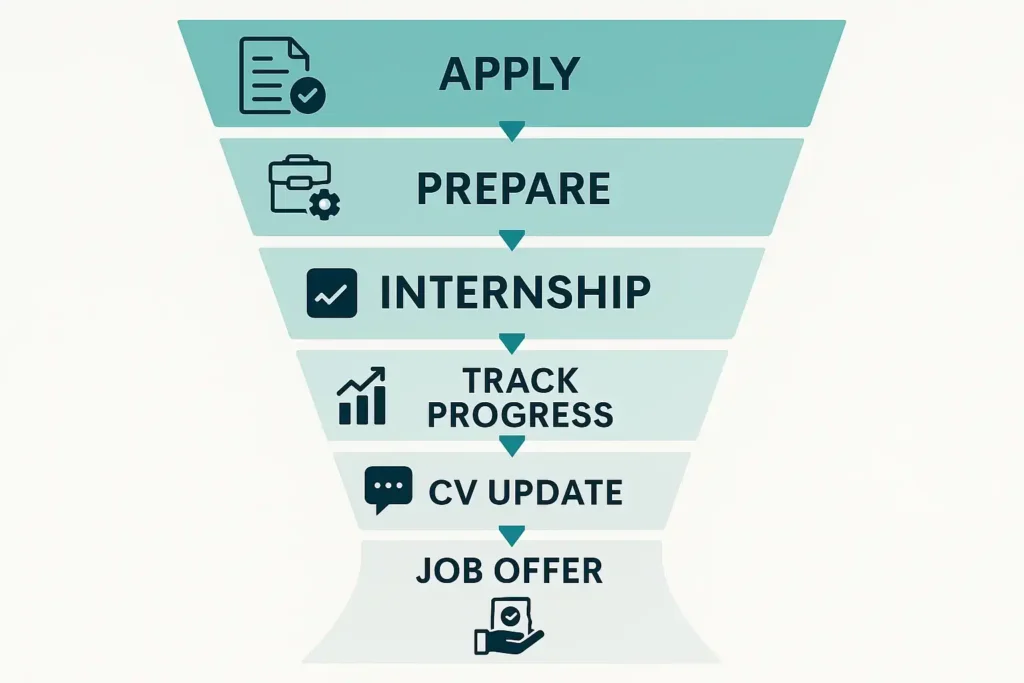
To better understand how internships fuel career momentum, here’s a simple lifecycle visual that outlines the typical journey from application to employment:
sqlCopyEdit📥 Application → 🧭 Preparation → 💼 Internship Start → 🔄 Feedback & Growth → 📄 Documentation → ✨ CV & LinkedIn Update → 🎯 Job Interviews → 📝 Job Offer
Each stage builds on the last. Preparation improves performance. Performance fuels documentation. Documentation powers job applications. With strategic guidance, like Brendan Hope’s coaching and CV services, this funnel leads not just to experience, but to employment.
Internship Conversion Rates: What the Data Tells Us
Internships aren’t just for learning, they’re hiring pipelines. Recent data paints a compelling picture of their value in landing full-time roles.
| Metric | Statistic | Source |
|---|---|---|
| Internship to job offer conversion | 66.4% of interns received job offers | NACE 2023 |
| Internship job offer acceptance | 53.3% accepted offers | NACE 2023 |
| Satisfaction drives success | 81.6% felt a sense of belonging during internship | NACE Student Survey |
| In-person vs remote | 58.5% of in-person interns converted, vs 46% remote | NACE |
| Paid vs unpaid outcomes | Paid interns more likely to receive offers | Chegg Internships |
These stats prove one thing: internships are no longer optional, they’re essential. With high conversion rates and increased visibility to employers, a well-executed internship could be your quickest path to employment.
Should You Move for an Internship? Pros and Cons
Relocating for an internship can feel like a leap, but sometimes, it’s a leap worth taking. Whether it’s a summer placement in a major city or a short-term project at a prestigious firm, moving can offer access to stronger networks, in-person mentorship, and high-impact opportunities that remote roles might lack.
According to UrbanBound, employers that offer relocation support have higher internship-to-job conversion rates, 53% vs. 50% for those that don’t. This suggests companies willing to invest in interns tend to retain them, making relocation potentially more worthwhile.
Pros:
- Immersive exposure to company culture
- Easier access to mentors and executives
- Stronger bonds with teammates and cross-departmental connections
Cons:
- Housing and travel costs
- Temporary disconnection from support systems
- Short-term relocation stress
If you’re considering a move, weigh the long-term career benefits against short-term disruptions. Brendan Hope’s coaching clients often find that strategic relocation, even for a brief internship, can lead to outsized returns when the role aligns with their goals.
Best Tools for Internship Success (Free & Paid)
Maximising your internship experience isn’t just about showing up; it’s about staying organised, reflective, and proactive. The right tools can help you track your growth, document achievements, and prepare for your next opportunity with ease.
For Task & Goal Management
- Trello (Free): Perfect for managing projects and visualising workflows.
- Notion (Free/Paid): All-in-one workspace to log tasks, notes, feedback, and weekly reflections.
For Journaling & Tracking Achievements
- Evernote (Free/Paid): Simple, searchable journaling tool for daily or weekly logs.
- Google Sheets/Docs (Free): Great for creating custom trackers, timelines, and performance summaries.
For CV & Career Development
- Brendan Hope CV Review & Coaching (Premium): Get expert guidance on translating your internship into career-ready documents.
- Grammarly (Free/Paid): Ensures your reports, emails, and LinkedIn updates are polished and professional.
Frequently Asked Questions About Internships
Whether you’re exploring your first internship or preparing for your third, questions often arise around expectations, best practices, and long-term value. Here are six of the most frequently asked internship questions, answered clearly and practically.
How long do internships usually last?
Most internships range from 8 to 12 weeks, especially during summer breaks, but some can extend to 6 months or more depending on the company and structure. Academic-year internships may be part-time, running across a semester, while full-time programs tend to be shorter but more intensive. Always check the timeline upfront and make sure it aligns with your availability and goals.
Are unpaid internships worth it?
It depends on the experience offered. If the internship provides hands-on learning, mentorship, and skill development, an unpaid role can still be valuable, especially in fields like non-profits, arts, or media. However, always ensure that the responsibilities are meaningful and not exploitative. If unsure, seek guidance from a career coach like Brendan Hope to evaluate its strategic worth.
Can I put an unpaid internship on my CV?
Absolutely. The key is to focus on what you accomplished, not whether you were paid. Employers care about results and skills more than compensation details. Use the same bullet-point format you’d use for paid roles and highlight impact, projects, and collaboration.
Should I ask for a reference after my internship?
Yes, especially if you performed well and built rapport with your supervisor. The ideal time to ask is within the final week, when your contributions are still fresh. You can say something like, “I’ve really appreciated working with you. Would you feel comfortable serving as a reference for future opportunities?” If possible, request a LinkedIn recommendation as well, which adds visibility to your profile.
What if I didn’t enjoy my internship? Should I still include it on my resume?
If you gained relevant skills, the answer is likely yes. Even a disappointing internship can provide transferable experiences, just be selective in how you present it. Focus on outcomes and lessons rather than job satisfaction. If the experience was entirely misaligned, it’s okay to omit it, especially if you have stronger examples.
Do virtual internships carry the same weight as in-person ones?
Increasingly, yes. Employers understand that remote work is part of the modern landscape, and remote internships that demonstrate initiative, communication, and impact are highly respected. The key is to highlight how you stayed proactive, managed tasks independently, and contributed value despite the distance.
Clear answers to these questions can save you stress, help you make smarter decisions, and position you more confidently in the job market. If you’re still unsure how your internship experience stacks up, Brendan Hope’s strategy sessions and CV audits can help you extract the most value, whether you loved your role or just survived it.
Start Your Internship Journey with Brendan Hope
An internship isn’t just a stepping stone, it’s your launchpad. Whether you’re a graduate navigating your first role, a career-changer testing a new industry, or a professional returning to the workforce, internships offer unmatched opportunities to learn, grow, and open doors to long-term success.
But experience alone isn’t enough. To truly capitalise on your internship, you need to frame it strategically, articulate your value, and position yourself for what comes next. That’s where Brendan Hope comes in.
With expert CV writing, LinkedIn optimisation, cover letter creation, and career coaching, we help you transform your internship into a powerful personal brand. Our proven methods have helped hundreds of clients go from uncertain to unstoppable.
Book your personalised CV review, LinkedIn audit, or career strategy session today, and let’s turn your internship into your next big opportunity.


Recent Comments